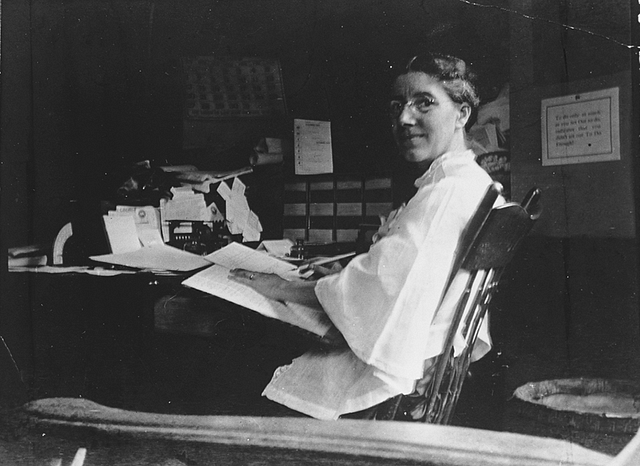Author Bibliography (in progress)
Gilman, Charlotte Perkins (1860-1935)
BIOGRAPHICAL NOTE
Charlotte Perkins Gilman was the daughter of Mary Anne Westcott and Frederic Beecher Perkins, who was the eldest son of Mary Foote Beecher and Thomas Clap Perkins. Mary Foote Beecher (Gilman’s paternal grandmother) was  the sister of Catharine Beecher and Harriet Beecher Stowe, making them Charlotte’s great-aunts. She devoted her life to women's rights and comprehensive proposals for social reform, serving as a delegate to the International Socialist and Labor Congress in 1896. Throughout her work, Gilman proposes a centralized home that outsources much of the work that is currently considered “feminine” (cooking/cleaning), in order to make it more efficient, safer, and better for society’s health. When this work is done by professionals, women are free to pursue other careers, though Gilman is explicit in citing motherhood as the ideal to which all women should aspire.
the sister of Catharine Beecher and Harriet Beecher Stowe, making them Charlotte’s great-aunts. She devoted her life to women's rights and comprehensive proposals for social reform, serving as a delegate to the International Socialist and Labor Congress in 1896. Throughout her work, Gilman proposes a centralized home that outsources much of the work that is currently considered “feminine” (cooking/cleaning), in order to make it more efficient, safer, and better for society’s health. When this work is done by professionals, women are free to pursue other careers, though Gilman is explicit in citing motherhood as the ideal to which all women should aspire.
PUBLICATIONS
“The Beast Prison.” The Forerunner Vol. 3 no. 11 (Nov. 1912): 128-130.
Charlotte Perkins Gilman: A Nonfiction Reader. Ed. Larry Ceplair. New York: Columbia University Press, 1991.
The Diaries of Charlotte Perkins Gilman. Ed. Denise D. Knight. Charlottesville: University Press of Virginia, 1994. 2 vols.
The Home: Its Work and Influence. New York: McClure, Phillips, 1903.
"The Housekeeper and the Food Problem." Annals of the American Academy Vol. 74 (Nov. 1917): 123-140.
A Journey from Within: The Love Letters of Charlotte Perkins Gilman, 1897–1900. Ed. Mary A. Hill. Lewisburg, PA: Bucknell University Press, 1995.
The Living of Charlotte Perkins Gilman: An Autobiography. New York and London: D. Appleton-Century Co., 1935.
The Man-Made World; or, Our Androcentric Culture. New York: Charlton Co., 1911.
Moving the Mountain. New York: Charlton Co., 1911.
"On Dogs." The Forerunner Vol. 2 no. 7 (July 1911): 180-183.
The Selected Letters of Charlotte Perkins Gilman. Ed. Denise D. Knight and Jennifer S. Tuttle. Tuscaloosa: University of Alabama Press, 2009.
Women and Economics: A Study of the Economic Relation Between Men and Women as a Factor in Social Evolution.
Last updated on October 24th, 2024
SNSF project 100015_204481
@VLS@veganism.social | VeganLiteraryStudies | @veganliterarystudies | @vegan_lit_studies
